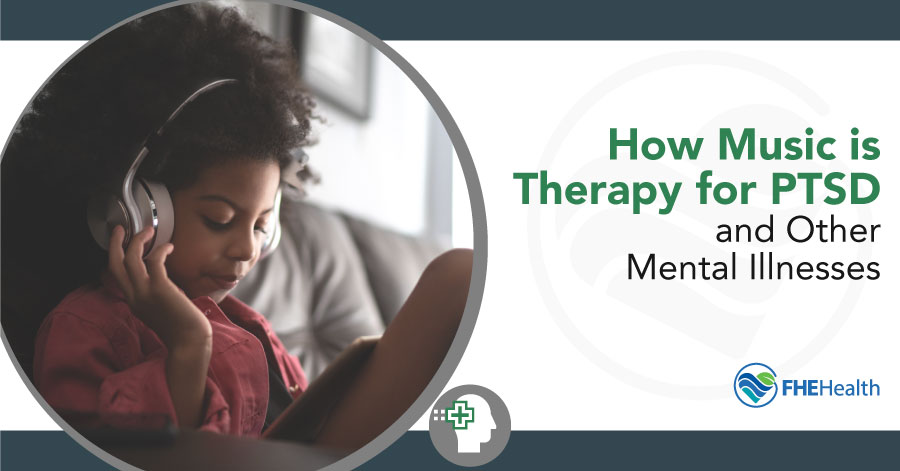
People who suffer from post-traumatic stress disorder (PTSD) can often benefit from listening to or creating music as part of their treatment. Patients have responded well to music therapy for PTSD in a clinical setting, and it’s a positive self-care technique as well. Studies have also supported using music therapy as a treatment for depression and other psychological disorders. Treatment that includes engaging in passive or active music therapy has been shown to reduce depressive symptoms and anxiety in participants.
People who experience PTSD may not show any signs of the disorder until something in their environment triggers a memory. When this occurs, it can result in dysfunctional coping mechanisms and uncomfortable or frightening feelings. The goal of counseling for PTSD is to improve day-to-day functioning and reduce symptoms, eventually eliminating them. Music therapy for depression, anxiety and PTSD gives individuals a chance to interact socially and participate in something they enjoy. Learning the typical symptoms of PTSD will help you understand what it is and whether you might have it.
What Is Post-Traumatic Stress Disorder?
Highly stressful, harmful, or upsetting situations or traumatic life events can cause psychological trauma that lingers for months and even years. Sometimes, symptoms of PTSD occur because of upsetting childhood trauma. Health care professionals, police officers, military personnel, and others with stressful jobs are also prone to PTSD, but it can occur in anyone.
What Are Signs of PTSD in Individuals?
Some survivors struggle with PTSD almost every day, while others mostly experience it when reminders of past trauma occur. PTSD can cause dysfunctional coping behaviors that are no longer needed once the distressing events are over. Frequently, sufferers have difficulty managing feelings of anger or sadness. They may lose the ability to concentrate, isolate themselves from others or abuse drugs. A person with PTSD may have some or all of these problems. Other symptoms include:
- Reliving the trauma
- Avoiding people or responsibilities
- Reacting forcefully to minor events
- Experiencing a mood disorder such as depression
If the above symptoms are present for one month or more, a mental health professional may diagnose PTSD in an individual. Other symptoms can include nightmares, fearfulness and becoming agitated when unwanted thoughts of the trauma intrude into daily life. Certain occurrences sometimes called triggers, may remind a person with PTSD of a distressing experience. This can cause them to feel upset long after an incident happened.
Treatment for PTSD
PTSD treatment varies according to the needs of the individual. Cognitive processing therapy encourages patients to face the memories of traumatic events. Prolonged exposure therapy includes a gradual return to doing things or going places that have been avoided. Talking about the sources of PTSD with a professional therapist can help a person reframe and gain control of negative feelings.
At FHE Health, we focus on all parts of a person, mental and physical. In some cases, illness can contribute to mental health problems. However, psychological issues can also affect health. An integrated treatment plan is developed that caters to an individual’s specific needs. Residential treatment and convenient, flexible outpatient counseling are available to support and heal our patients.
Music Therapy for PTSD
One type of treatment for psychological problems such as PTSD is music therapy. Health care professionals and psychologists have used music to achieve physical and mental wellness in patients with good results. A provider trained in music therapy can tailor the type of music to a person based on their preferences. Listening to soothing music can calm fears and relax tight muscles, helping patients benefit from treatments. Health problems such as high blood pressure, chronic pain, depression and PTSD can often be alleviated with music therapy.
If you have PTSD, it can make you feel agitated, fearful or depressed and keep you from enjoying activities you like. Music therapy is one way to combat those feelings. Almost everyone responds to music, and most people have a preferred type that helps them calm down and relax. Listening to music in a clinical setting can make you more open to rehabilitation sessions for PTSD. Music helps depression because it gives you something enjoyable to focus on when life may seem meaningless or difficult.
Music therapy for PTSD can help you push away negative thoughts through the enjoyment of favorite sounds. Sometimes, people can change their feelings by listening to music that reminds them of happy and peaceful times. Music therapy can also be a positive part of self-care. There are two kinds of music therapy: passive and active. Both have shown positive results in PTSD sufferers.
Passive Music Therapy
Passive music therapy is the act of listening to music that soothes you or makes you happy. For PTSD sufferers, it can include listening to music while exercising or doing household chores. Or, you might lie down and relax while listening to music you enjoy or use it to achieve a meditative state. PTSD music therapy can not only lift your mood but also positively affect physiological processes such as heart rate.
Active Music Therapy
Active music therapy is the creation of music. Rhythmic movements have been found to alleviate stress, calm breathing and improve focus. Like passive music therapy, active music therapy can have a positive effect emotionally and physically. Some people report that it makes them feel more in control and more creative.
Anyone can engage in this type of PTSD music therapy, and musical talent isn’t necessary. Drumming is a frequently used type of active music therapy that has helped people achieve relaxation and pain control.
How to Seek Help
If you’re experiencing the uncomfortable feelings and lifestyle limitations of PTSD, we can help. FHE Health is an accredited mental health and substance abuse treatment center that offers the most current and effective treatments, including music therapy for depression and PTSD. The first step in your recovery is reaching out for help. Talk to one of our compassionate counselors today by calling (833) 596-3502.






